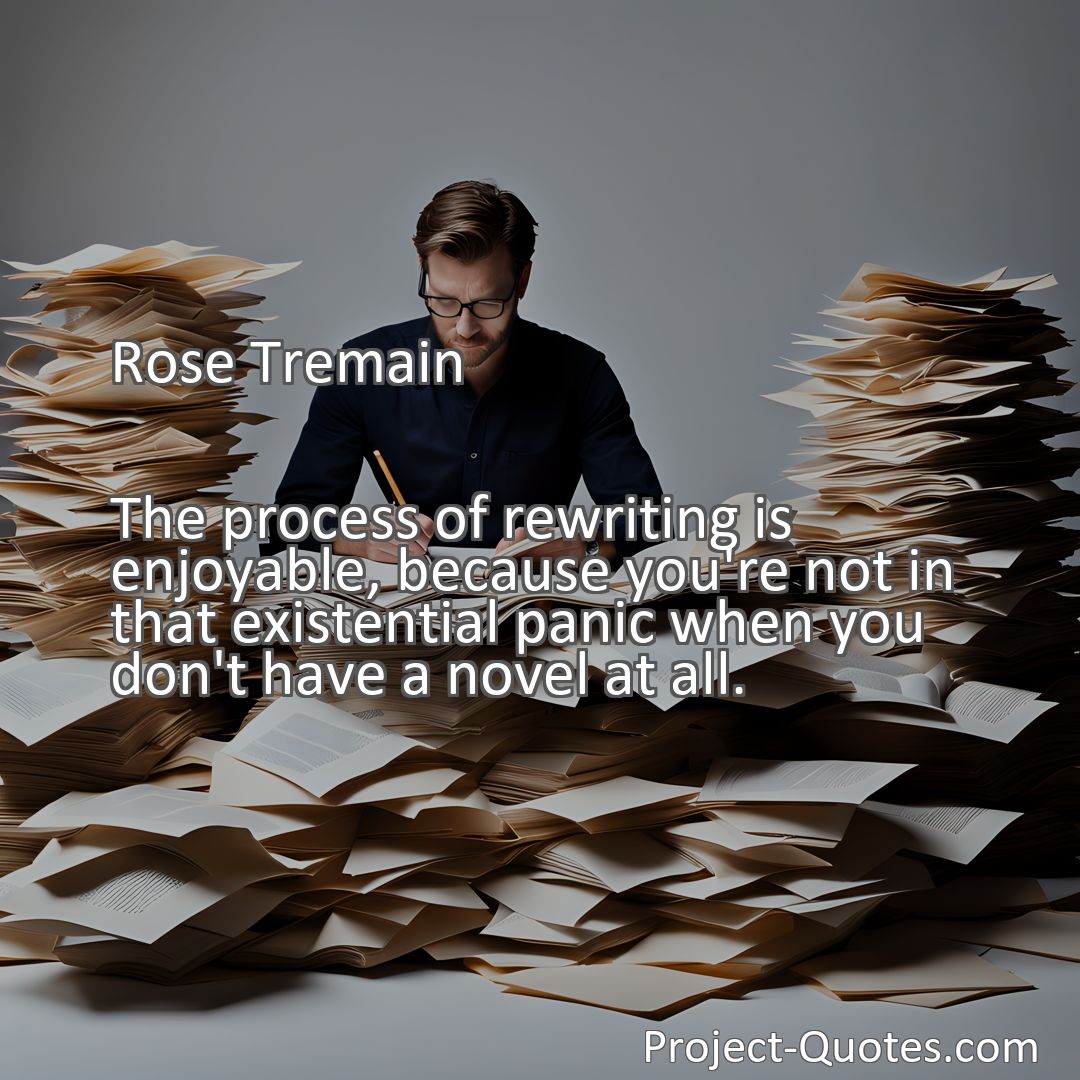The process of rewriting is enjoyable, because you’re not in that existential panic when you don’t have a novel at all.
Rose Tremain
In the journey of rewriting, aspiring authors may stumble upon hidden gems that were obscured during the first draft. This stage offers the opportunity to refine the narrative, enhance character development, and uncover fresh inspiration. Embracing the transformative power of rewriting allows writers to turn their initial drafts into literary masterpieces, bringing them closer to fulfilling their creative aspirations.
Table of Contents
- 1 The process of rewriting is enjoyable, because you’re not in that existential panic when you don’t have a novel at all.
- 2 Rose Tremain
- 3 Meaning of Quote – The process of rewriting is enjoyable, because you’re not in that existential panic when you don’t have a novel at all.
- 4 Freely Shareable Quote Image
- 5 Related
Meaning of Quote – The process of rewriting is enjoyable, because you’re not in that existential panic when you don’t have a novel at all.
The renowned author Rose Tremain once said, “The process of rewriting is enjoyable, because you’re not in that existential panic when you don’t have a novel at all.” These words carry a profound truth that resonates with both experienced writers and those who have just embarked on their literary journey. Tremain beautifully captures the essence of rewriting, highlighting its transformative power and the sense of relief it brings to aspiring authors.
When we begin to write a novel, we often find ourselves plagued by doubt and uncertainty. The blank page stares back at us, mocking our attempts to translate the wondrous stories playing in our minds into words. However, Tremain’s insight reminds us that rewriting, with all its nuances and challenges, holds the key to overcoming this existential panic.
To truly appreciate the joy of rewriting, it is crucial to understand that the first draft is merely the initial attempt to give shape to our ideas. As we dive into the writing process, we are often cautioned against self-editing or getting hung up on perfection. Instead, we are encouraged to let our thoughts flow freely, to explore new horizons without the burden of self-doubt. This initial burst of creativity is exhilarating, indeed, but it is during the rewriting stage that our novel takes shape and begins to shine.
Imagine rewriting as molding a piece of clay. The first draft may be rough around the edges, but as we revisit our words, we gradually refine them. We chisel away the unnecessary bits, smoothing the narrative’s flow and enhancing its clarity. Each tweak brings us closer to the vision we hold in our minds, granting our characters more depth, our plot more intrigue, and our overall story more resonance.
While rewriting may initially seem daunting, it provides us with the opportunity to reevaluate our work objectively. It is a time to critically assess the plot structure, character development, dialogue, and pacing, ensuring they align with our intended narrative. Through rewriting, we can trace the threads of our story, resolving inconsistencies, and amplifying its emotional impact. This process allows us to discard what doesn’t work and refine what does, ultimately elevating our novel to its fullest potential.
Moreover, rewriting offers space for creativity and experimentation. It provides a chance to explore alternative plot directions, to rewrite scenes from different perspectives, and even to introduce new characters who might enrich the story. As we rewrite, we may stumble upon hidden gems that were obscured during the first draft, giving us fresh inspiration and motivation to dive deeper into our craft.
Tremain’s quote also touches upon the notion of immense satisfaction that accompanies the act of rewriting. When we revisit our work, we are not merely making edits; we are witnessing the evolution of our story firsthand. Each improvement, each adjustment, brings us closer to the finished product we always envisioned. This realization kindles a sense of accomplishment, infusing us with the necessary fuel to keep going.
Moreover, rewriting provides an opportunity to strengthen our connection with the characters we have created. As we delve into their minds, emotions, and motivations during the editing process, we become intimately acquainted with their journeys and struggles. We find ourselves rooting for their success, empathizing with their failures, and experiencing a profound sense of attachment to these fictional beings. This emotional bond not only enhances the quality of our writing but also makes the rewriting process all the more enjoyable.
In addition to the immense gratification inherent in rewriting, this stage also offers a chance for self-discovery and personal growth. As we analyze our writing objectively, we gain insights into our strengths and weaknesses as storytellers. We begin to recognize recurring patterns in our writing style, identify areas where we can improve, and develop a stronger sense of our unique literary voice. Through the act of rewriting, we learn to be receptive to constructive criticism, embracing it as a tool for growth rather than a blow to our self-esteem.
The process of rewriting can be likened to a journey of self-reflection and self-improvement. It requires discipline, patience, and resilience. Each edit, revision, and rewrite brings us closer to the version of the novel that we initially envisioned but struggled to articulate. This experience empowers us as writers, reasserting our belief in the power of storytelling and reminding us of the profound impact our words can have on readers.
In conclusion, Rose Tremain’s words remind us that the process of rewriting should never be underestimated. It is through the act of rewriting that authors can transform their initial drafts into masterpieces. It is through rewriting that stories come alive, characters breathe, and worlds enchant. So embrace the journey of rewriting, for it is a labor of love that ultimately brings us closer to fulfilling our literary aspirations.
I hope this quote inspired image brings you hope and peace. Share it with someone who needs it today!


